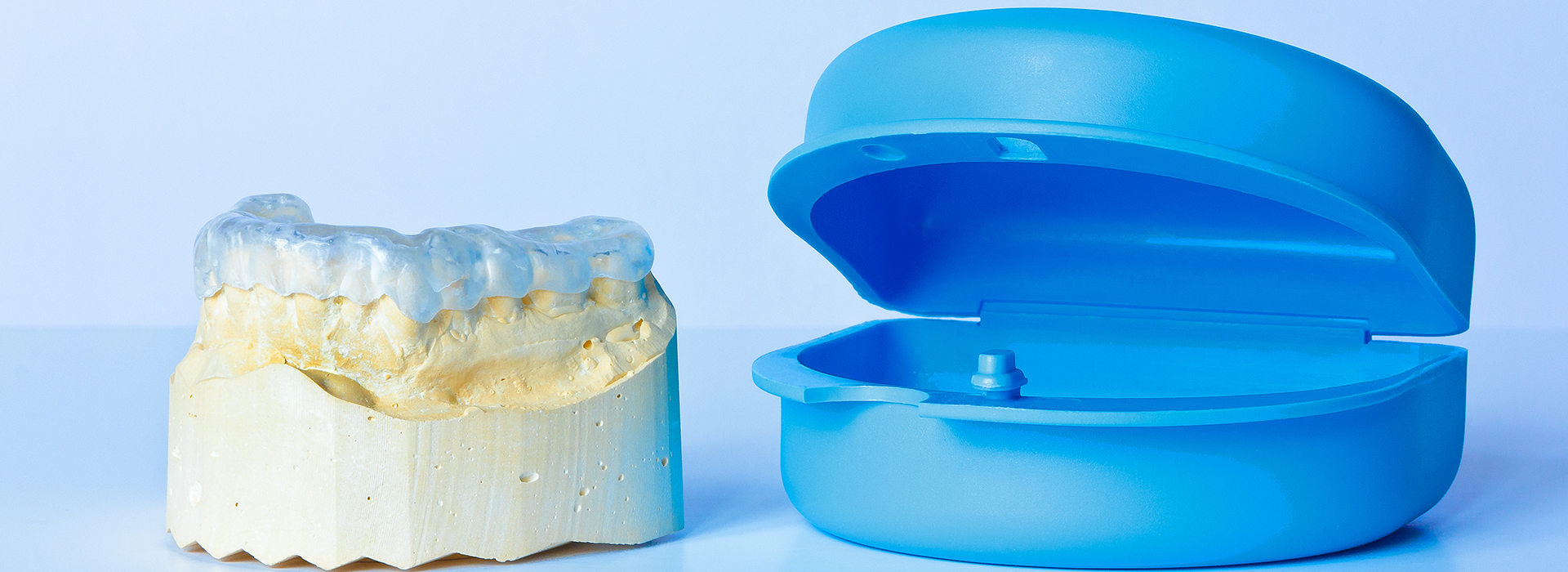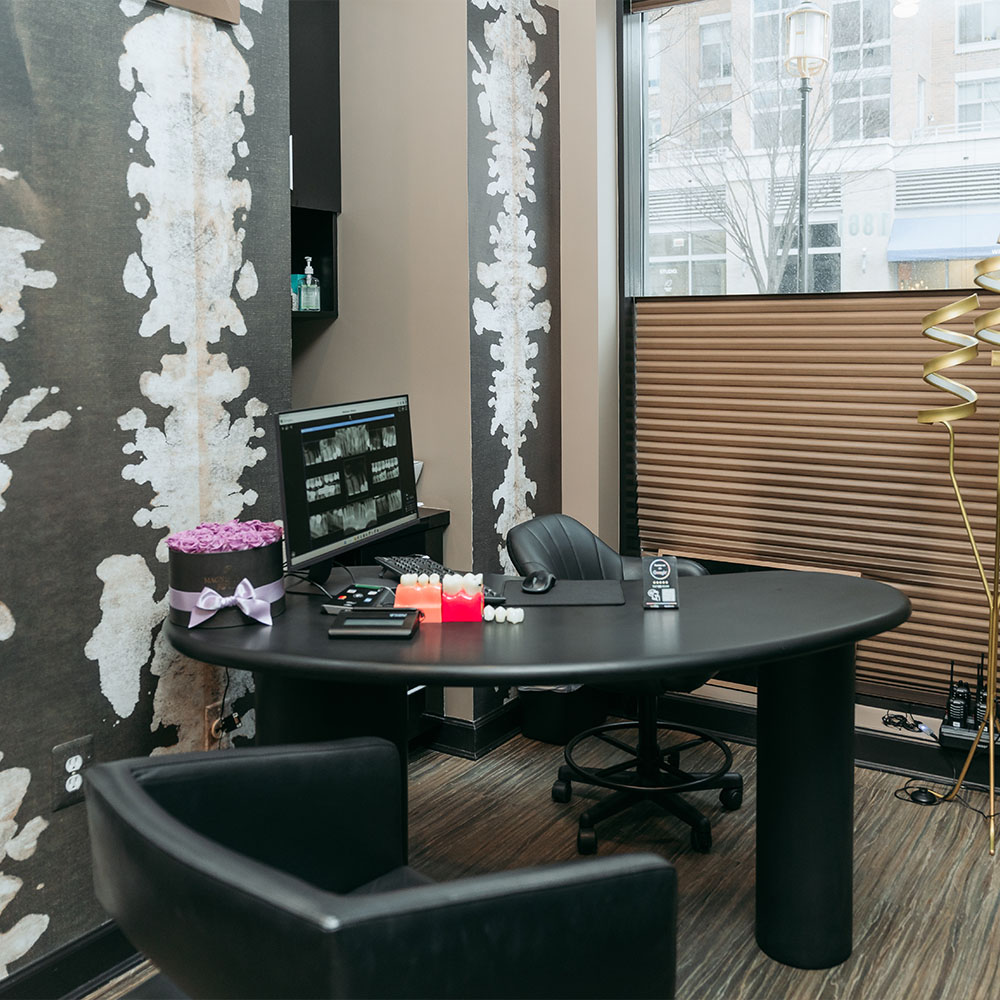
Bruxism is the clinical term for involuntary teeth grinding and jaw clenching. It can happen during the day, but for many people the most damaging episodes occur during sleep, when the body isn’t consciously protecting the teeth. Typical signs that suggest nocturnal bruxism include morning jaw pain, tension-type headaches, tooth sensitivity, and a feeling that the bite is “off.” Left unchecked, these symptoms can progress to more serious dental problems and persistent TMJ (temporomandibular joint) discomfort.
Several factors contribute to the development of bruxism. Psychological stress and anxiety are common triggers, but mechanical and physiological issues also play a role — for example, an abnormal bite, missing or misaligned teeth, certain sleep disorders, and sometimes the side effects of medications. Genetics and individual sleep patterns can influence susceptibility as well, which is why a careful dental and medical history is an important part of any evaluation.
Because bruxism often occurs without conscious awareness, patients may not realize they have a problem until symptoms appear or a partner notices grinding noises. Early recognition matters: addressing bruxism in its early stages can prevent enamel erosion, cracked restorations, and chronic jaw pain. A tailored treatment plan begins with a clear diagnosis and consideration of each patient’s unique risk factors and daily habits.
When patients seek help, the goal is twofold: protect the teeth from immediate wear and reduce the muscular and joint strain that causes pain. A night guard is one of the most effective, non-invasive tools for achieving those objectives, and it often serves as the first line of defense while clinicians evaluate underlying causes and complementary therapies.
A night guard acts as a physical barrier that separates the upper and lower teeth during sleep, preventing direct tooth-to-tooth contact. This simple function significantly reduces the mechanical stress that leads to chipping, fracturing, and accelerated wear of enamel. By absorbing and redistributing the forces generated by grinding, a properly fitted appliance helps preserve both natural teeth and dental restorations such as crowns or veneers.
Beyond protecting hard tissues, night guards reduce muscle strain and lessen pressure on the temporomandibular joints. When the jaw muscles are permitted to clench repeatedly throughout the night, they can become fatigued and inflamed, resulting in pain and limited movement. Wearing a night guard encourages more relaxed jaw positioning and can break the cycle of nocturnal clenching that provokes TMJ flare-ups.
Many patients report improved sleep quality once the physical symptoms are reduced. With less tooth-related pain and lower muscle tension, nights can be more restful and mornings less achy. While a night guard is not a cure for all causes of bruxism, it is an effective protective measure that buys time for clinicians and patients to explore longer-term strategies, from bite adjustments to stress-management techniques.
Night guards are available in several forms, and the choice should be guided by the severity of grinding, the presence of dental work, and patient comfort. Over-the-counter “boil-and-bite” guards are less expensive and offer a quick solution, but they are molded without a detailed assessment of bite forces or dental anatomy. These options may feel bulky, wear down quickly, or fail to provide adequate protection for patients with heavy grinding.
By contrast, custom-fitted night guards fabricated in a dental laboratory from detailed impressions or digital scans provide superior fit, durability, and comfort. They are designed to match the patient’s bite and distribute forces evenly. Clinicians can also select different materials and thicknesses depending on whether a patient primarily clenches (which might favor a firmer material) or grinds (which sometimes responds well to slightly more resilient options).
There are also design variations — stabilization splints that provide uniform contact and repositioning splints that change jaw alignment in controlled ways. The right design depends on clinical findings and the treatment goals. Your dentist will explain the expected benefits and trade-offs of each option so you can make an informed choice based on your symptoms and oral health needs.
Whichever type is selected, the best outcomes come from a solution that balances protection, comfort, and compliance. A guard that fits well and feels manageable is far more likely to be worn consistently, which is essential for preventing further dental damage and relieving symptoms.
Producing a custom night guard begins with a comprehensive evaluation that assesses tooth wear, bite relationships, muscle tenderness, and sleep-related symptoms. During this visit the dentist will take a detailed history and perform an oral exam to identify contributing factors such as missing teeth, restorations, or signs of TMJ dysfunction. If indicated, the team may use digital technologies like intraoral scanning to capture a precise record of your bite.
From impressions or scans, the laboratory crafts a device that conforms to your dental anatomy and occlusal dynamics. When the appliance is ready, the patient returns for a fitting appointment where the dentist checks fit, comfort, and occlusal contacts. Minor adjustments are normal and important to ensure the guard protects teeth without introducing new pressure points or altering the bite in unintended ways.
Follow-up visits allow clinicians to monitor how the guard is performing and to make any necessary refinements. If symptoms persist or change, the appliance can be re-evaluated as part of a broader care plan — for instance, incorporating stress reduction strategies, physical therapy, or referral to a sleep specialist if a sleep disorder is suspected. This collaborative approach helps address both the mechanical and systemic contributors to bruxism.
Adapting to a night guard can take a few nights to a few weeks; many patients find the initial sensation unusual but ultimately tolerable, especially once discomfort and morning pain subside. Proper care is straightforward: rinse the appliance after use, clean it with a non-abrasive cleanser, and store it in its case between wearings. Regular inspection for cracks or excessive wear is important so that your dentist can recommend repairs or replacement when necessary.
Long-term use of a well-fitted night guard can significantly slow the progression of tooth wear and reduce the frequency and intensity of jaw pain and headaches. For patients who have invested in restorative dentistry, a guard protects those restorations from early failure due to excessive force. Periodic dental checkups allow your clinician to assess both the guard’s condition and any changes in your oral health that could affect its performance.
Comfort and compliance are key to success. If an appliance feels uncomfortable, speak with your dentist — small adjustments often make a big difference. Combining a night guard with lifestyle changes, sleep hygiene improvements, and stress-management techniques will produce the best overall results for many patients.
At Smiles Dental at Reston Town Center, our team emphasizes individualized care that blends modern diagnostics with practical solutions to protect your smile and ease discomfort. If you suspect you’re grinding your teeth or waking up with jaw pain, we can evaluate your symptoms and discuss whether a custom night guard is an appropriate step for your oral health.
In summary, night guards are a practical, non-invasive way to shield teeth and jaw joints from the damaging effects of nocturnal grinding. They protect restorations, reduce muscle strain, and can improve sleep-related symptoms while clinicians investigate underlying causes. To learn whether a night guard is right for you, please contact us for more information.

Teeth grinding, or bruxism, is often multifactorial and can arise from both behavioral and physiological sources. Psychological stress and anxiety are common contributors, especially during periods of heightened tension or poor sleep. Medical factors such as sleep apnea, certain medications, and neurological conditions can also increase the tendency to clench or grind.
Dental and occlusal issues like a misaligned bite, missing teeth, or poorly fitting restorations may exacerbate nocturnal grinding by changing how the teeth contact each other. Genetics and individual sleep patterns play a role, meaning some people are naturally more susceptible. Understanding the underlying triggers helps clinicians tailor treatment beyond simply protecting the teeth.
Common warning signs include persistent morning jaw soreness, frequent tension-type headaches, increased tooth sensitivity, and observable wear facets on the enamel. Partners may report audible grinding during sleep, and patients can notice changes in how they bite or feel that their bite is "off." These symptoms often develop gradually, so they can be easy to overlook until damage is present.
A dental exam that reveals enamel loss, cracked restorations, or muscle tenderness should prompt further evaluation for nocturnal bruxism. Your dentist will review medical history, medications, and sleep habits to identify contributing factors. Early assessment allows for protective measures that prevent further damage and limit the need for restorative treatment later on.
A night guard provides a durable barrier that separates the upper and lower teeth, preventing direct tooth-to-tooth contact and reducing the mechanical forces that cause chipping and accelerated wear. By redistributing grinding forces, it helps preserve enamel and prolong the life of existing restorations such as crowns or veneers. The device also reduces concentrated pressure on individual teeth that can lead to fractures or loosening.
In addition to protecting hard tissues, a well-fitted night guard can decrease muscle hyperactivity and lower strain on the temporomandibular joints. This reduction in muscular tension often leads to fewer episodes of jaw pain and can ease related headaches. While it does not cure the root cause in every case, a night guard is an effective first-line tool to limit damage and improve comfort while further evaluation proceeds.
Over-the-counter boil-and-bite guards are convenient and lower in initial effort, but they are molded without a comprehensive evaluation of your bite and occlusal forces. These guards can feel bulky, wear more quickly, and sometimes fail to provide sufficient protection for heavy grinders or patients with complex dental work. They may be appropriate for short-term use or mild clenching but often lack the durability and comfort of a custom solution.
Custom night guards are fabricated from impressions or digital scans to match your dental anatomy and bite relationships precisely. Dental laboratories can select materials and thicknesses to suit whether a patient primarily clenches or grinds, producing better force distribution and long-term performance. Because fit and comfort are improved, patients are more likely to wear custom devices consistently, which enhances protective benefits.
The process begins with a thorough dental evaluation that reviews signs of wear, jaw muscle tenderness, and any sleep-related symptoms. Your dentist will take impressions or digital scans of your teeth to capture an accurate record of your bite and tooth anatomy. These records are sent to a laboratory where a technician fabricates a device designed for your occlusal dynamics and material preferences.
When the guard is ready, you will return for a fitting appointment where minor adjustments are made to ensure even contacts and comfort. Follow-up visits allow the clinician to monitor fit and symptom relief, and to make refinements if necessary. This staged approach helps integrate the appliance into a broader care plan that may include bite therapy or referrals for sleep evaluation when indicated.
Daily care is simple: rinse the guard after each use, brush it gently with a soft toothbrush and non-abrasive cleanser, and store it in its protective case away from heat or direct sunlight. Avoid hot water and abrasive cleaners that can warp or scratch the material. Inspect the appliance regularly for cracks, thinning, or other signs of wear that could compromise protection.
Bring your night guard to dental appointments so your clinician can evaluate its condition against changes in your bite or oral health. When repairs or replacement are needed, your dentist will recommend the best course of action to maintain effective protection. Proper care and timely attention to damage maximize the life and performance of the device.
A night guard can reduce the muscular strain and joint loading that often contribute to temporomandibular joint discomfort and tension-type headaches. By providing a more stable and relaxed jaw posture during sleep, the appliance helps interrupt cycles of nocturnal clenching that inflame muscles and joints. Many patients experience fewer morning aches and a decrease in frequency or intensity of associated headaches once protective therapy begins.
It is important to view the guard as one component of a comprehensive management plan for TMJ disorders, which may also include physical therapy, behavioral strategies such as stress reduction, and targeted dental treatments when necessary. If symptoms persist or worsen despite wearing a properly fitted appliance, your dentist may refer you for further evaluation to identify additional contributing factors.
When properly designed and adjusted, a night guard should not permanently change your bite or damage your teeth. Initial sensations of altered occlusion are common as the muscles and teeth adapt to the appliance, but these feelings often diminish after a few nights of consistent wear. Careful occlusal adjustments by a clinician help ensure the device provides protection without introducing new pressure points.
Problems can arise if a guard is ill-fitting, improperly designed, or worn without professional oversight, so regular follow-up is important. If you notice persistent changes in how your teeth meet, increased soreness, or new dental symptoms, contact your dentist so the appliance can be re-evaluated and adjusted as needed.
Longevity varies based on material, grinding intensity, and how well the device is cared for, but many custom night guards last several years with proper maintenance. Heavy grinders may wear through appliances more quickly, while softer materials can show signs of flattening or surface fatigue sooner. Regular inspection and routine dental checkups allow clinicians to track wear and recommend replacement before protection is lost.
Signs that a night guard needs replacement include visible cracks, significant thinning, persistent discomfort, or a change in fit that prevents even occlusal contacts. Timely replacement helps avoid dental damage from a compromised appliance and ensures continued relief from symptoms associated with bruxism.
Night guards can be appropriate for adolescents and adults depending on dental development, the presence of permanent teeth, and the severity of bruxism. In younger patients still experiencing tooth eruption or orthodontic changes, clinicians may recommend monitoring or temporary solutions until dental relationships stabilize. For adults, custom guards can be designed to accommodate crowns, bridges, implants, and other restorations to provide targeted protection.
When significant restorative work is present, your dentist will evaluate how forces are distributed and may choose specific materials or designs to protect both natural teeth and prosthetics. A personalized assessment ensures the device supports long-term oral health goals while minimizing risk to existing dental work. At Smiles Dental at Reston Town Center, we tailor recommendations to each patient’s restorative landscape and functional needs.

Ready to schedule your next dental appointment or have questions about our services?
Contacting Smiles Dental at Reston Town Center is easy! Our friendly staff is available to assist you with scheduling appointments, answering inquiries about treatment options, and addressing any concerns you may have. Whether you prefer to give us a call, send us an email, or fill out our convenient online contact form, we're here to help. Don't wait to take the first step towards achieving the smile of your dreams – reach out to us today and discover the difference personalized dental care can make.